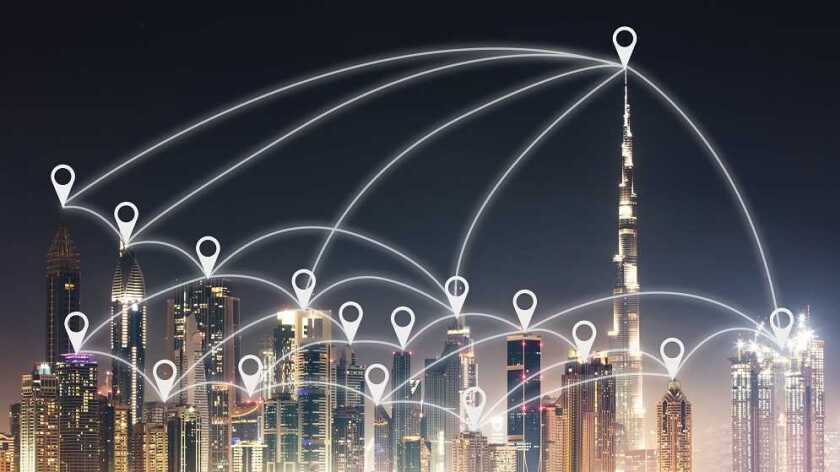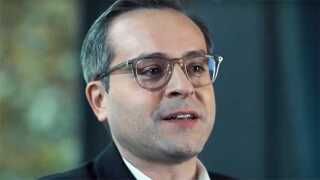Smile and the world smiles with you, goes the well-known self-help saying. This seems applicable to Dubai’s vision for the coming years, with the government putting full steam behind developing a flagship smart city to help fulfil its ambition of creating the “happiest” city on Earth.
In line with this, the Smart Dubai initiative has targeted a “happiness rate” of 95 per cent for the city by 2021. While it is arguable whether a figure can really be put on emotions, the direction is clear and reflects how the Middle East as a whole is trying to put itself at the forefront of smart city developments – with multiple governments in the region outlining their digital “visions” for the coming years.
These developments open the door for telecoms carriers to help boost this sense of well-being through smart city strategies, while tying together their projects in a variety of up-and-coming areas such as the internet of things (IoT), AI and blockchain.
“Telcos are well positioned to drive the smart city through a managed services approach,” says Spyros Salpeas, head of digital innovation and key customer programmes for the Middle East and Africa at Orange Business Services. “They can offer these services based on an opex model, by creating and investing in the most common, high-cost components of the smart city – infrastructure, cloud and IoT platforms.”
One such project is the construction of Dubai’s first integrated smart city in its Silicon Park development, set for completion during the first quarter of the year – an initiative in which du and Orange Business Services have partnered to deliver a full range of smart city services, showing how telcos can be at the centre of such programmes.
The 150,000-square-metre area comprises office and commercial space, as well as residential and hotel accommodation, and will feature smart energy, amenities and services, and environmentally sustainable transport. It will also include a central operations centre that will help collect and coordinate all information from the park’s installed devices.
Salpeas explains that Orange Business Services has been building its position in the Middle East over the last decade, playing the role of “master systems integrator” with the region’s smart city operators and governments. Of operators in general, he says: “The smart city space is very active and fragmented, but telcos are well positioned to play the ‘orchestration’ role in this situation.”
Along with du, the company is also supporting a programme in Dubai that has been working with 40 start-up companies to drive innovative models in fields such as urban automation, smart transportation and government, and open city data.
Cities of the future
There are a whole host of other smart city initiatives in the Middle East, with Saudi Arabia’s futuristic $500 billion NEOM megacity project being among the most ambitious and other governments in the region driving their visions for the future. In another move last July, the government in Oman signed a deal with South Korea to cooperate on developing a smart city in the Special Economic Zone in the port town of Duqm.
Aside from the opportunities that such projects create in a whole host of business verticals, this will all boost the need for extra data, capacity and interconnection.
In Oman, Omantel announced a joint venture last summer with data centre provider Equinix to create a carrier-neutral hub near the capital Muscat that is expected to open later this year. This will allow carriers, and content and cloud providers to colocate data infrastructure, creating a regional interconnection hub to boost Equinix’s existing presence in Dubai and Abu Dhabi.
“For a city to become smart, it needs to be highly interconnected,” says Jeroen Schlosser, managing director for Equinix in the Middle East. “Smart cities require robust digital infrastructure that physically, and most importantly, securely links dispersed sensors, devices and machines that collect and share data, so they can exchange and process information in real time.”
He also points out the huge amount of data that the cities of the future could require, considering that some estimate a self-driving car may generate 4 terabytes of data a day.
Schlosser explains that Oman has the advantage of also having access to submarine cables that connect Asia-Pacific to the Middle East to Europe, opening the pathway to global access. Omantel itself leverages six landing stations in Oman and has investments in 20 subsea cable systems.
And getting infrastructure right is seen as key to maximise the opportunity from smart cities. “The networks of carriers will be stretched to the max, and consequently will offer lucrative commercial opportunities for those telcos with the right infrastructure in place,” says Ahmed Abdel-Latif, chief wholesale officer for the Bahrain-based Batelco Group. “Batelco believes that a telco is the best-positioned entity to act as orchestrator of the experience of living in a smart city.”
Abdel-Latif says further that the promise of 100Mbps broadband opens the door for massive amounts of data traffic to be aggregated and delivered by wholesale carriers, whether for entertainment, education, health or day-to-day city management – and explains that Batelco has committed to a National Broadband Network programme that will be an enabler to future smart cities.
“As more and more demand for data traffic is generated by smart cities, the more appealing the business case for building telco data centres gets,” he adds.
Bettina Tratz-Ryan, research VP at Gartner, highlights that one of the key areas where carriers can have an impact is in distributing computing towards the edge of the network, leading to more distributed data centre and cloud requirements. “There is an increasing number of data sets and computing requirements that need to be executed instantly. Carriers will need to shift their focus from delivering connections to scalable and service-aware architectures “
Culture change
Tratz-Ryan adds there is a need for carriers to shift to a more agile smart culture to make the most of these projects. “The carrier’s end goal has to be that they can ‘invest’ themselves in the strategy of the city from the beginning, moving from a service provider to an advisor,” she says. “If the carrier is not from the beginning a partner in those projects, it is really difficult to step in ‘after the fact’.”
Kuwait-based Zain sought to achieve such agility by making a strategic investment in smart city provider NXN – formerly neXgen – three years ago, leading to the establishment of a specialised business unit to deliver smart city services.
NXN CEO Ghazi Atallah says the company’s independence has allowed it to be nimble, agile and faster to market, helping Zain transition into more of a digital smart service provider aided further by NXN having more than a decade of experience in the market. He points out that it can be a big challenge to move to this new type of model for telcos that simply create an in-house smart city team. “You have to change the DNA, change the culture, and put the right people and technology in place,” he says.
He believes this will help Zain move not just towards achieving Kuwait’s 2035 Vision, but also towards growing smart city projects in the region’s other countries. Initiatives that NXN has been developing include a managed security service, a partnership with du for the provision of smart energy services across the UAE, and a partnership focusing on Middle Eastern digital healthcare programmes.
Such services allow operators to move up the value chain from the lower revenues from providing connectivity for IoT devices alone, helping to take away the “digital headache” from customers by offering them a much more wide-reaching service, says Atallah. “There is much more value associated with the delivery of the projects, a lot more expertise brought in from a combination of consulting, architecture, experts, software and so on, so you can certainly command a higher gross margin for these types of project.”
And aside from revenue alone, carriers can gain significant insight from the vast volumes of data being created, putting them in a great position to view the market trends and what’s coming next.
One of the biggest challenges for smart cities in the Gulf is the sheer scale of the ambition, says Salpeas. “Nowhere in the world have there been smart city projects launched on this scale and with this amount of energy and drive behind them.” But, he says, that gives players such as Orange Business Services great scope for acting as a digital partner to governments and developers.
Jitendra Kapoor, an analyst of IDC, says that aside from the government push towards digital in the region, major events such as Expo 2020 in Dubai and the 2022 World Cup in Qatar are helping drive the smart city push. This has been highlighted by Etisalat already making announcements on early 5G deployments to support Dubai’s Expo.
Kapoor says carriers have a real chance to seize the opportunity in being at the centre of developing these ecosystems, particularly given the potential insight from the vast quantities of data they have access to. “Being at the centre of the data and IoT ecosystem enables them to leverage this and take them to full-fledged digital service providers going forward,” he says.
City as a platform
Players such as Etisalat, NXN and Orange are signatories to industry body the TM Forum’s so-called “city-as-a-platform” manifesto, a set of principles that acts a guide to unite the many large and small organisations involved in each smart city programme – which could help coordinate these multiple parties.
Paul Wilson, who is chief marketing officer at the TM Forum, believes that the bigger opportunity will come as the countries in the Middle East launch 5G over the next few years. “This is where smart cities will start to develop more quickly, by deploying IoT capabilities and ultra-reliable low-latency capabilities to assist in infrastructural services such as traffic, water and energy management, alongside a variety of citizen-focused services,” he says.
In Dubai and elsewhere in the Middle East, says Zain’s Atallah, smart city plays are being referred to as “lighthouse” projects for other parts of the world – and telcos have a key part to play.
“They’re the natural partner, because they typically already have the telecoms infrastructure, which is a fundamental building block for smart city deployments,” he says. “They also have the capability and size to be able to address those kinds of projects.”





